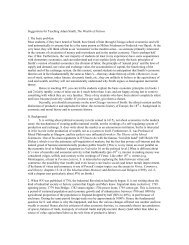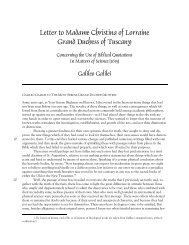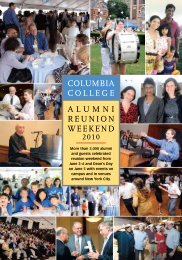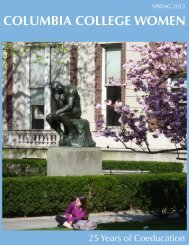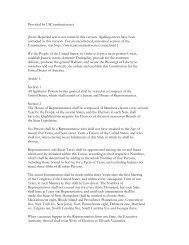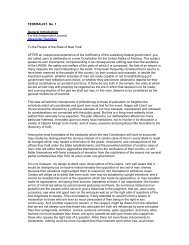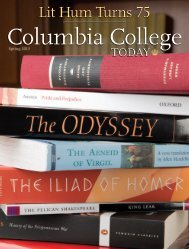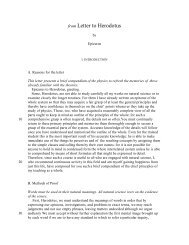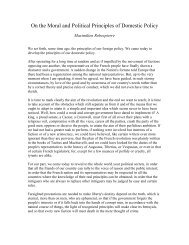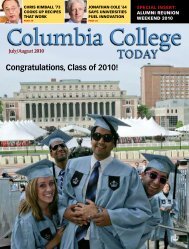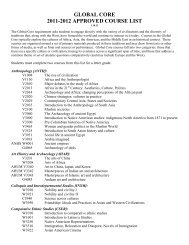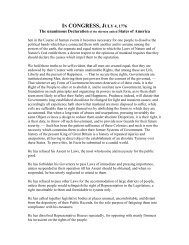Download this issue as a PDF - Columbia College - Columbia ...
Download this issue as a PDF - Columbia College - Columbia ...
Download this issue as a PDF - Columbia College - Columbia ...
You also want an ePaper? Increase the reach of your titles
YUMPU automatically turns print PDFs into web optimized ePapers that Google loves.
AROUND THE QUADS<br />
COLUMBIA COLLEGE TODAY<br />
COLUMBIA COLLEGE TODAY<br />
AROUND THE QUADS<br />
Frances Champagne is an<br />
<strong>as</strong>sociate professor in the<br />
Department of Psychology<br />
focusing on behavioral neurosciences,<br />
maternal behavior<br />
and epigenetics. Born and<br />
raised in Canada, Champagne<br />
earned her undergraduate<br />
degree at Queen’s University,<br />
and her m<strong>as</strong>ter’s in psychiatry<br />
and Ph.D. in neuroscience<br />
at McGill University. She h<strong>as</strong><br />
been at <strong>Columbia</strong> since 2006<br />
and runs the Champagne Lab<br />
in psychobiology and neuroscience<br />
in addition to her<br />
professorial responsibilities.<br />
What drew you to<br />
psychology<br />
I always had an interest<br />
in it, probably more clinically<br />
oriented; I did a m<strong>as</strong>ter’s in<br />
psychiatry to explore that<br />
interest. I w<strong>as</strong> interested<br />
in schizophrenia and did a<br />
m<strong>as</strong>ter’s project looking at<br />
genetic and environmental<br />
factors and how they influence<br />
symptoms in schizophrenic<br />
individuals. I liked it<br />
but found I couldn’t <strong>as</strong>k the<br />
kind of mechanistic questions<br />
I w<strong>as</strong> interested in; it w<strong>as</strong> fine<br />
that these individuals had<br />
had these early experiences<br />
or traum<strong>as</strong> but I wanted to<br />
know more, in terms of how<br />
these experiences could lead<br />
to abnormal behaviors.<br />
How would you describe<br />
epigenetics to a layperson<br />
Epigenetics refers to the control<br />
of gene activity. We have<br />
our DNA but it h<strong>as</strong> to do<br />
something, it h<strong>as</strong> to produce<br />
something, to affect our biology.<br />
Epigenetics refers to the<br />
factors that can control that;<br />
the factors around DNA<br />
that can serve <strong>as</strong> kind<br />
of an on/off switch to<br />
gene activity. And then<br />
that gets laid into our<br />
biology and can l<strong>as</strong>t<br />
across the lifespan and<br />
lead to variations in<br />
stress reactivity, social<br />
behavior and reproductive<br />
behavior. … This work<br />
shows how the interplay between<br />
genes and the environment<br />
works. It brings people<br />
p<strong>as</strong>t the dichotomy of nature<br />
and nurture and moves them<br />
into something new.<br />
And what’s your interest<br />
within epigenetics<br />
I’m most interested in how<br />
early life experiences shape<br />
the brain, shape our behavior.<br />
For example, how toxins in<br />
the environment affect our<br />
behavior and might incre<strong>as</strong>e<br />
risk of psychopathology or<br />
health problems; how stress<br />
does the same thing; how<br />
mother-infant interactions can<br />
promote well-being or inhibit<br />
well-being. And then, what<br />
the long-term and multigenerational<br />
consequences are —<br />
meaning, the experiences you<br />
have during your life span<br />
shape you but they can also be<br />
p<strong>as</strong>sed along generations.<br />
What sort of work can undergraduates<br />
get involved with<br />
in your lab<br />
Quite a lot: For example, because<br />
we study mother/infant<br />
interactions, we have undergrads<br />
help with characterizing<br />
the mother/infant interactions<br />
in mice and rats. It’s hard to<br />
fit research around a cl<strong>as</strong>s<br />
schedule, and that’s something<br />
they can come in and<br />
do for an hour and then leave.<br />
We also have students looking<br />
at gene expression, taking<br />
brain t<strong>issue</strong> and analyzing<br />
what genes are incre<strong>as</strong>ed and<br />
decre<strong>as</strong>ed in their activity.<br />
We have students looking at<br />
different protein levels in the<br />
brain.<br />
What do you think students<br />
get out of working in a lab<br />
Five Minutes with ... Frances Champagne<br />
It’s fine to read about findings<br />
in papers but it’s quite<br />
another to be involved in the<br />
research and see how it’s actually<br />
done. I think it’s quite<br />
shocking at first — it’s a lot<br />
of work and it’s not always<br />
the most exciting work all the<br />
time. But it’s about the process<br />
of science. So I think they<br />
learn a lot.<br />
What do you teach<br />
I teach a big lecture course,<br />
“The Developing Brain,” and<br />
also two undergraduate seminars.<br />
I’ve been on maternity<br />
leave, though, and I just got<br />
back <strong>this</strong> p<strong>as</strong>t semester.<br />
What’s the most valuable<br />
thing a professor can do for<br />
his or her students<br />
Get them to appreciate how<br />
complex the process of science<br />
and the process of discovery<br />
is. You read textbooks<br />
and everything sounds so<br />
final and understood and<br />
clear — and something that’s<br />
hard to do in a lecture cl<strong>as</strong>s<br />
but that I can do in my<br />
seminar cl<strong>as</strong>ses, where I<br />
can interact with the students<br />
a bit more, is get<br />
them to critique the science<br />
that’s out there and<br />
realize that nothing’s<br />
perfect. That’s why we<br />
keep going with it, because<br />
we don’t have any final answers;<br />
there’s always something<br />
more to do or something<br />
that we can do better.<br />
So, I think in terms of pursuing<br />
a career in academia,<br />
that’s invaluable. Knowing<br />
that there are these weaknesses<br />
in all the work that’s done<br />
but that we can actually deal<br />
with that and do better.<br />
What’s your favorite place<br />
to be<br />
I go to York in Yorkshire, England,<br />
quite a lot; that’s where<br />
my husband [Assistant<br />
Professor of Psychology<br />
James Curley] is from.<br />
We met in Cambridge,<br />
actually, but York is an old<br />
city with so much history<br />
that you don’t get in North<br />
America.<br />
What’s a talent that you’d<br />
like to have<br />
To play the violin.<br />
If you weren’t a professor<br />
and a scientist, what would<br />
you like to do<br />
Probably run a small bookstore.<br />
It’d be nice to be<br />
somewhere surrounded by<br />
literature.<br />
What’s on your nightstand<br />
Baby books.<br />
How about your DVR Any<br />
guilty ple<strong>as</strong>ures<br />
Game of Thrones, which I can’t<br />
really watch right now because<br />
of the baby. Too violent.<br />
You said she’s your first<br />
Yes, Isabelle. She’s 14 months.<br />
So, does that mean you’ve<br />
started thinking about your<br />
research in relation to your<br />
own life<br />
Well, to some degree [laughs].<br />
But I also think there’s a risk<br />
of knowing too much and<br />
worrying too much. That’s<br />
one thing I know from work<br />
— it’s best not to be stressed.<br />
Interview: Alexis Tonti ’11 Arts<br />
Photo: Lynn Saville<br />
<strong>College</strong> Fetes<br />
Lit Hum at<br />
75 Years<br />
On April 26, alumni, parents<br />
and students gathered in<br />
Low Rotunda to celebrate<br />
“#LitHum75: Dialogues<br />
on the 75th Anniversary<br />
of Literature Humanities,” an event<br />
dedicated to the late Jacques Barzun ’27,<br />
’32 GSAS. The conversation began in<br />
Low Rotunda with introductions by<br />
Roosevelt Montás ’95, director of the<br />
Center for the Core Curriculum and<br />
<strong>as</strong>sociate dean of academic affairs, and<br />
Dean James J. Valentini, followed by a<br />
panel moderated by Gareth Williams,<br />
the Violin Family Professor of Cl<strong>as</strong>sics<br />
and chair of Literature Humanities.<br />
The panel featured Core faculty members<br />
James V. Mirollo ’61 GSAS, the<br />
Parr Professor Emeritus of English and<br />
Comparative Literature; Julie Crawford,<br />
<strong>as</strong>sociate professor of English and comparative<br />
literature; and Jessamyn Conrad,<br />
a Ph.D. candidate in the Department<br />
of Art History and Archaeology; <strong>as</strong> well<br />
<strong>as</strong> Huilong Han ’15 and Jacqueline Bryk<br />
’13. The dialogue focused on the way Lit<br />
Hum h<strong>as</strong> changed and its current relationship<br />
to the digital age.<br />
Immediately afterward, alumni and<br />
parents were invited to join students in<br />
cl<strong>as</strong>srooms across campus for seminarstyle<br />
discussion groups where attendees<br />
discussed either preselected works from<br />
the Lit Hum curriculum or their opinions<br />
about what they considered to be<br />
the most important part of the Core. This<br />
w<strong>as</strong> followed by a reception featuring<br />
remarks by Valentini and Edward Tayler,<br />
the Lionel Trilling Professor in the Humanities<br />
Emeritus, held in the Faculty<br />
Room in Low Library.<br />
Throughout the evening participants<br />
near and far were invited to join the conversation<br />
live and share Lit Hum memories<br />
by tweeting to #LitHum75.<br />
To explore the evening’s tweets, visit twitter.<br />
com/searchq=%23lithum75; to join the<br />
conversation, share your own memories by<br />
tweeting to #LitHum75.<br />
For more information about Literature<br />
Humanities’ 75 years at <strong>Columbia</strong>, visit<br />
college.columbia.edu/core/lithum.<br />
Four Alumni Honored with John Jay Awards<br />
PHOTO: EILEEN BARROSO<br />
Four accomplished alumni — Thom<strong>as</strong><br />
Cornacchia ’85; Katori Hall ’03; Mike<br />
Schmidtberger ’82, ’85L; and Dr.<br />
George Yancopoulos ’80, ’86 GSAS, ’87<br />
P&S — were presented with 2013 John<br />
Jay Awards for distinguished professional<br />
achievement on March 6 at Cipriani 42nd<br />
Street. Proceeds from the annual John<br />
Jay Awards Dinner benefit the John Jay<br />
National Scholars Program, which aims<br />
to enhance academic and extracurricular<br />
experiences for outstanding first-year<br />
<strong>College</strong> students. This year’s dinner raised<br />
$1.4 million.<br />
Above, Dean James J. Valentini (far left)<br />
joins the John Jay Scholars who presented<br />
the honorees with their awards, and the<br />
honorees, at the dinner. Left to right: Bryan<br />
Terraz<strong>as</strong> ’13; Cornacchia; Ethan Kogan ’13;<br />
Hall; Ariana Lott ’13; Schmidtberger; Yancopoulos;<br />
and Tehreem Rehman ’13.<br />
To read more about the dinner, see a<br />
Facebook photo album and view a video,<br />
visit college.columbia.edu/news/archive/<br />
2012-13.<br />
We’ve got you covered.<br />
Through <strong>Columbia</strong> Alumni Association,<br />
Group Term Life Insurance is available in<br />
amounts up to $1,000,000, underwritten<br />
by New York Life Insurance Company<br />
(NY, NY 10010), on Policy Form GMR.<br />
For details including features, costs, eligibility,<br />
renewability, limitations and exclusions, ple<strong>as</strong>e<br />
visit alumni.columbia.edu/alumni-discounts or<br />
call the plan administrator at 800-223-1147.<br />
or 12<br />
SUMMER 2013<br />
10<br />
SUMMER 2013<br />
11



